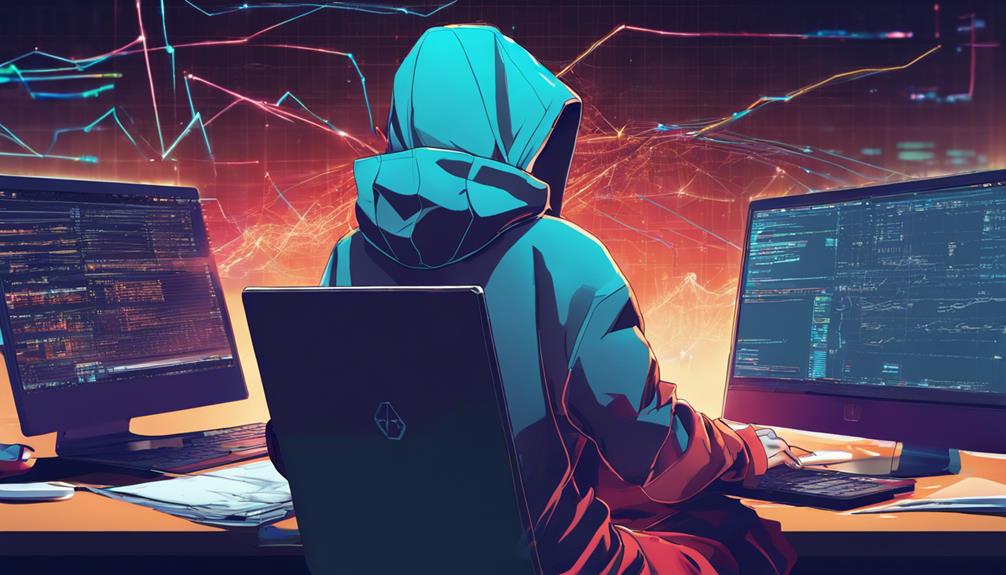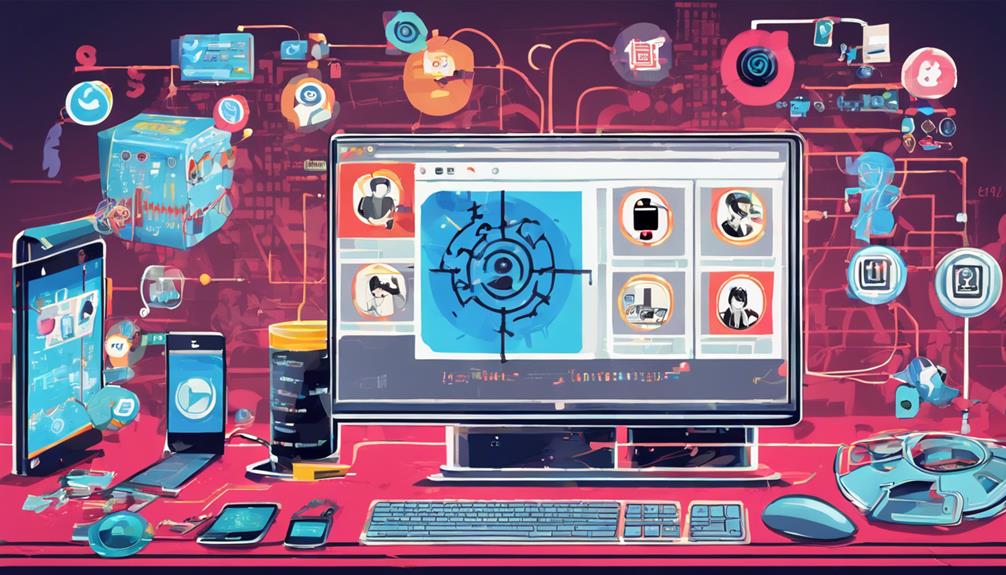In comparing digital marketing and ethical hacking, both offer lucrative career paths. Digital marketing focuses on promoting goods and services, requiring skills like data analysis, content strategy, and digital advertising. On the other hand, ethical hacking involves protecting systems and data through tasks like penetration testing and incident response, demanding technical expertise in cybersecurity. Ethical hacking is experiencing significant growth, with escalating security risks driving the need for skilled professionals, potentially leading to higher salaries. Both fields require continuous learning to stay current and advance. Further exploration can shed light on detailed insights into these promising career choices.
Key Takeaways
- Ethical hacking offers higher salaries due to the specialized technical skills demanded.
- Digital marketing provides lucrative opportunities by leveraging creative strategies for brand promotion.
- The demand for ethical hackers is escalating, leading to competitive market conditions.
- Digital marketers can advance to CMO roles, while ethical hackers can progress to CISO positions.
- Both careers offer growth potential through continuous education and adapting to industry trends.
Job Roles Comparison
When comparing job roles in digital marketing and ethical hacking, it is evident that each field offers distinct positions with unique responsibilities and focuses. Ethical hacking roles, also known as cybersecurity professionals, encompass a range of positions such as cybersecurity analyst, security architect, ethical hacker, and Chief Information Security Officer (CISO). These professionals are tasked with protecting systems, networks, and data from digital threats, ensuring the confidentiality, integrity, and availability of information.
On the other hand, digital marketing positions include marketing manager, content strategist, SEO specialist, and social media manager. Professionals in this field are responsible for promoting goods/services, enhancing brand recognition, and driving customer engagement through various online channels.
While digital marketers focus on creative and strategic aspects of promoting products and services, cybersecurity professionals in ethical hacking engage in technical and analytical tasks to secure sensitive information from cyberattacks. Each field demands specific skills and educational backgrounds, with digital marketing typically requiring degrees in marketing or communications, and cybersecurity necessitating qualifications in computer science or IT.
Skills and Education

Comparing the skill requirements and educational backgrounds between digital marketing and ethical hacking reveals distinct paths for professionals in each field. Digital marketing careers typically seek individuals with degrees in marketing, business, or communications. These programs emphasize creativity, market research, and proficiency in digital marketing strategies like SEO and social media management.
On the other hand, ethical hacking roles require degrees in computer science, IT, or cybersecurity. These educational backgrounds focus on information security, hacking techniques, and compliance requirements.
Essential skills for digital marketers include data analysis, content strategy, and digital advertising. In contrast, ethical hackers need expertise in penetration testing, network security, and incident response.
Continuous education and certifications are crucial in both fields to stay abreast of industry trends and emerging technologies, especially for ethical hackers due to the rapidly growing demand for cybersecurity professionals. This demand presents lucrative opportunities for ethical hackers with specialized technical skills and knowledge in information security.
Industry Demand Analysis

The industry demand analysis highlights the significant growth in job opportunities for cybersecurity professionals, particularly in the field of ethical hacking. With the escalating number of security risks faced by organizations worldwide, the need for skilled professionals adept at identifying vulnerabilities and safeguarding systems has never been more crucial.
According to the Bureau of Labor Statistics, there is a projected 31% increase in job opportunities for cybersecurity experts by 2029, underscoring the rising demand for ethical hackers. As organizations continue to invest in cybersecurity measures to protect against cyber threats and data breaches, the role of ethical hackers in fortifying defenses becomes increasingly essential.
The scarcity of qualified ethical hackers has resulted in a competitive market, leading to higher salaries and benefits for professionals in this field. Ethical hacking has emerged as a linchpin in cybersecurity defense strategies, making ethical hackers indispensable assets in the ongoing battle against cybercrime.
Work Environment Insights

In the domain of digital marketing and ethical hacking, distinct work environments shape the professional landscape for practitioners in each field. Digital marketing thrives in dynamic and collaborative settings, fostering creativity to meet sales targets. Professionals in this field adapt to market trends and campaign effectiveness for success. On the other hand, ethical hacking environments prioritize network security and data protection, requiring a structured and risk-averse approach to stay ahead of emerging threats.
| Work Environment | Digital Marketing | Ethical Hacking |
|---|---|---|
| Focus | Creativity and innovation to meet sales targets | Network security and data protection |
| Culture | Dynamic and collaborative, emphasizing adaptability to market trends | Structured and risk-averse, requiring precision and vigilance |
| Emphasis | Meeting deadlines and achieving sales targets | Security measures and threat response readiness |
These contrasting environments offer practitioners unique challenges and rewards, catering to those inclined towards marketing strategy or safeguarding digital assets.
Career Progression Paths

Career advancement in the fields of digital marketing and ethical hacking involves progressing through various roles based on skills, expertise, and industry recognition. Digital marketing professionals typically start in entry-level positions and can advance to roles such as marketing manager or chief marketing officer (CMO) by showcasing campaign success and adapting to evolving consumer behaviors.
On the other hand, ethical hackers begin in technical roles and work their way up to senior positions like Chief Information Security Officer (CISO) by demonstrating expertise in cybersecurity and staying informed about emerging cyber threats.
In digital marketing, career paths revolve around understanding market trends, creating effective marketing campaigns, and leveraging data analytics for decision-making. For evolving cyber professionals, acquiring certifications like Certified Information Systems Security Professional (CISSP) or Certified Information Security Manager (CISM) is essential for career progression.
Both digital marketing and ethical hacking offer diverse opportunities for growth, each requiring continuous skill development and adapting to industry demands.
Salary Comparison

Comparing the financial rewards of digital marketing and ethical hacking reveals a significant disparity in average annual salaries. Ethical hackers typically earn higher salaries than digital marketers, with an average annual salary of around $95,000 compared to $63,000 for digital marketers.
The demand for ethical hackers is on the rise, leading to increased salary potential within the cybersecurity field. While digital marketers' salaries may vary based on factors like experience, industry, and location, ethical hackers often command competitive salaries due to the critical nature of their work.
In certain industries such as finance and healthcare, ethical hacking roles can offer even higher salaries, sometimes exceeding $120,000 annually. Unlike digital marketing, where salaries can be influenced by performance-based bonuses and commissions, ethical hacking salaries tend to be more stable and lucrative.
This disparity in average salaries underscores the financial differences between these two career paths, highlighting the potentially higher earning potential for ethical hackers in the current job market.
Ethical Implications

Exploring the domain of ethical implications, professionals in both ethical hacking and digital marketing industries must uphold integrity and adhere to established ethical guidelines.
Ethical hacking, aimed at uncovering security vulnerabilities, necessitates a commitment to ethical conduct to prevent unauthorized access and security breaches. Ethical hackers are tasked with identifying weaknesses in systems to enhance cybersecurity defenses and protect organizations from potential threats.
On the other hand, digital marketers must guarantee data privacy, transparency in advertising, and ethical practices to maintain consumer trust. They face ethical dilemmas related to targeted advertising, data collection, and avoiding deceptive strategies that could harm individuals or organizations.
Both careers require professionals to make decisions aligned with industry standards and regulations to navigate ethical challenges effectively. Upholding ethical standards is paramount in both fields to maintain trust, integrity, and professionalism while safeguarding against ethical lapses that could have detrimental consequences.
Technological Adaptability

Technological adaptability plays a pivotal role in both ethical hacking and digital marketing careers. In the fast-paced world of cybersecurity, ethical hackers must constantly refine their skills to combat emerging threats effectively.
Similarly, digital marketers need to stay abreast of new technologies to craft innovative strategies that resonate with target audiences in this ever-evolving digital landscape.
Skill Development Opportunities
Professionals in digital marketing and ethical hacking both have the opportunity to enhance their skill sets through continuous learning and technological adaptability. In digital marketing, individuals can develop expertise in data analytics, social media management, SEO, and content creation to adapt to evolving marketing trends.
On the other hand, ethical hackers can enhance their skills in penetration testing, network security, cryptography, and vulnerability assessment to stay ahead of emerging threats in the cybersecurity landscape.
Both careers require staying updated on the latest security technologies to remain competitive.
Technological adaptability is essential in digital marketing to leverage new tools for effective campaigns.
In ethical hacking, understanding emerging cyber threats and security measures is crucial.
Professionals can benefit from gaining certifications and attending training programs to expand their skill sets and enhance their career prospects.
Industry Demand Trends
The increasing reliance on digital technologies across industries has propelled the demand for professionals with strong technological adaptability skills in both digital marketing and ethical hacking fields. As cyber threats continue to rise, the need for skilled security analysts in ethical hacking is evident, with job opportunities projected to grow by 31% from 2019 to 2029.
Similarly, digital marketing is experiencing a surge in demand, particularly in e-commerce, where companies are investing heavily in online advertising and social media campaigns to engage their target audience effectively.
Professionals in both fields must stay abreast of evolving technologies and trends. Ethical hacking experts need to continuously update their knowledge on cybersecurity threats and defense mechanisms through ongoing learning and certifications.
On the other hand, digital marketers are adapting to changing technology trends by focusing on mobile marketing, video content, and influencer partnerships to enhance consumer engagement. The demand for tech-savvy and adaptable professionals underscores the dynamic nature of the digital landscape in both industries.
Work-Life Balance Considerations

Work-life balance considerations in both digital marketing and ethical hacking play a significant role in daily tasks and stress management.
While digital marketers may benefit from flexible schedules and remote work options, ethical hackers might experience irregular hours and high-pressure situations during cyber attacks, potentially impacting their well-being.
Balancing work demands with personal life is essential to prevent burnout and maintain a healthy lifestyle in these fast-paced and demanding career paths.
Balance in Daily Tasks
Achieving a healthy work-life balance in the fields of digital marketing and ethical hacking requires strategic time management and boundary setting. In the domain of digital marketing, professionals often engage in creative strategies, market research, and content creation, allowing for a certain level of flexibility in their daily tasks.
Conversely, ethical hackers typically follow a more structured routine, focusing on network security assessments, vulnerability testing, and incident response, which can be technically demanding. To find equilibrium in their daily responsibilities, individuals in these fields should consider the following:
- Setting Priorities: Identifying key tasks and allocating time accordingly is essential for managing workload efficiently.
- Establishing Boundaries: Clearly defining work hours and personal time helps in maintaining a separation between professional duties and personal life.
- Utilizing Time-Management Tools: Leveraging technology such as scheduling apps or project management software can aid in organizing tasks effectively.
- Regular Communication: Keeping open lines of communication with colleagues or clients can prevent misunderstandings and reduce work-related stress.
Managing Stress Levels
To navigate the demands of their professions effectively, individuals in digital marketing and ethical hacking must prioritize managing stress levels as a critical aspect of maintaining a healthy work-life balance.
In digital marketing, stress management often revolves around coping with tight deadlines, meeting client demands, and staying updated with rapidly evolving trends in the industry.
On the other hand, ethical hacking presents its challenges, characterized by the high-pressure nature of combating cybersecurity threats and the constant need for vigilance to protect sensitive data from breaches.
Balancing work responsibilities with personal life is paramount in both fields to prevent burnout and sustain productivity levels. Ethical hackers, in particular, face the stress of safeguarding valuable information, dealing with potential security breaches, and carrying the weighty responsibility of ensuring data protection.
As a result, individuals in digital marketing and ethical hacking must develop effective stress management techniques to thrive in their careers and maintain a healthy work-life balance.
Frequently Asked Questions
Is Digital Marketing Better or Cyber Security?
When comparing digital marketing and cybersecurity, it's important to take into account individual preferences, skills, and career aspirations. Both fields offer unique opportunities for growth and impact, so choosing the one aligning with your strengths and interests is vital.
Which Is Better, Digital Marketing or Ethical Hacking?
When comparing digital marketing and ethical hacking, the choice between the two careers depends on individual interests, skills, and career goals. While digital marketing focuses on creativity and strategic promotion, ethical hacking emphasizes cybersecurity and technical expertise.
Is Digital Marketing a Lucrative Career?
Embracing a dynamic landscape, digital marketing emerges as a promising career choice. The industry's lucrative prospects are underscored by competitive salaries, abundant job opportunities, diverse sectors to work in, and the potential for substantial growth through specialized skill sets.
Is Digital Marketing High Paying?
Digital marketing can be a high-paying career, with Digital Marketing Managers averaging $73,000 annually and experienced Directors earning over $100,000. Salaries vary based on industry, location, and experience level, making it a potentially lucrative field.
Conclusion
To sum up, when comparing digital marketing and ethical hacking as career paths, it is evident that both offer lucrative opportunities for professionals.
However, the demand for ethical hackers continues to rise rapidly, providing a promising outlook for those interested in cybersecurity.
Ultimately, individuals must consider their skills, interests, and the ethical implications of their chosen field to make an informed decision about their career trajectory.









